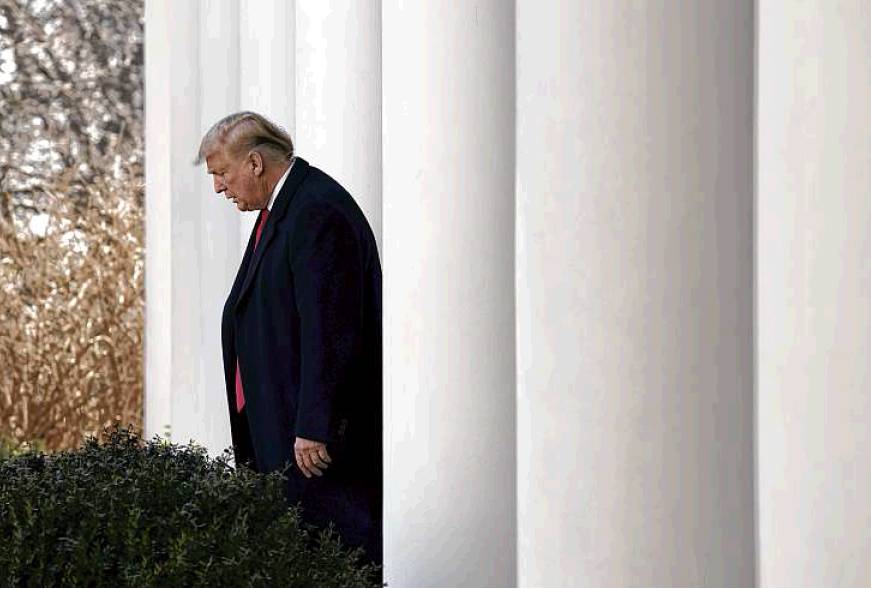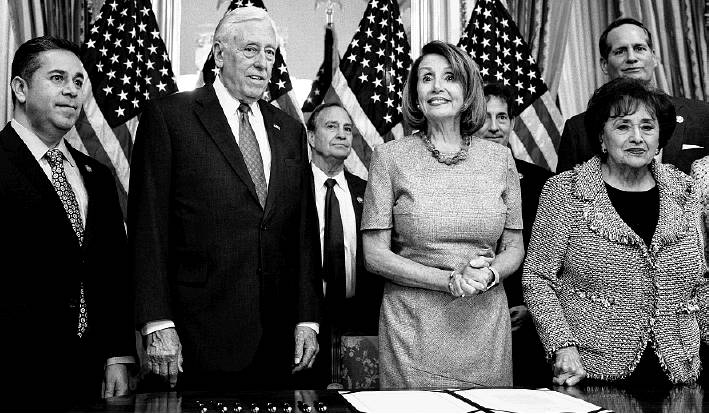SHUTDOWN
Government reopens as Trump relents for now
Stopgap deal sets Feb. 15 deadline to reach border security agreement
By Nicholas Fandos, Sheryl Gay Stolberg and Peter Baker NEW YORK TIMES
WASHINGTON — President Donald Trump agreed Friday to reopen the federal government for three weeks while negotiations continued over how to secure the nation’s southwestern border, backing down after a monthlong standoff failed to force Democrats to give him billions of dollars for his long-promised wall.
The president’s concession paved the way for the House and the Senate to both pass a stopgap spending bill by voice vote. Trump signed it Friday night, restoring normal operations at a series of federal agencies until Feb. 15 and opening the way to paying the 800,000 federal workers who have been furloughed or forced to work without pay for 35 days.
The plan includes none of the money for the wall that Trump had demanded and was essentially the same approach he rejected at the end of December and Democrats have advocated since, meaning he won nothing concrete during the impasse. Trump presented the agreement with congressional leaders as a victory anyway, and indicated in a speech in the Rose Garden that his cease-fire may only be temporary: If Republicans and Democrats cannot reach agreement on wall money by the February deadline, he said he was ready to renew the confrontation or declare a national emergency to bypass Congress.
“We really have no choice but to build a powerful wall or steel barrier,” Trump said. “If we don’t get a fair deal from Congress, the government will either shut down on Feb. 15, or Iwill use the powers afforded to me under the laws and Constitution of the United States to address this emergency.”
But Trump has already adopted some of the language his Democratic adversaries have used during the longest shutdown in U.S. history. He conceded that “we do not need 2,000 miles of concrete wall from sea to shining sea — we never did” and invoked the utility of “smart walls” that substitute some physical barriers for drones and other sensors. The semantic evolution provides both the president and Democrats with a face-saving way forward if they want it.
On Capitol Hill, though, jittery lawmakers from both parties greeted the news with relief. Trump relented as the effects of the shutdown were rippling with ever greater force across the economy, with fallout far beyond paychecks. On Friday, air traffic controllers calling in sick slowed air traffic across the Northeast; hundreds of workers at the IRS also did not show up; and the FBI director said he was as angry as he had ever been over his agents not being paid.
“None of us are willing to go through this again,” said Sen. Lisa Murkowski of Alaska, referring to a half dozen Republicans who voted Thursday for a Democratic measure to reopen the government for two weeks. “And it’s not just a few of us. There are a great many in our conference that feel pretty strongly.”
Democrats, who declined to revel in their clear victory, said they would work in good faith to strike a deal on border security. They have raised their offer on border security funding considerably and toughened their rhetoric on stopping illegal immigration.
But Speaker Nancy Pelosi of California stated plainly that any compromise would not include money for a new border wall, which Democrats view as ineffective and overly costly even though many have supported border fencing in the past.
“Have I not been clear on a wall?” Pelosi said at a news conference with Sen. Chuck Schumer of New York, the Democratic leader. The two have repeatedly said they would support allocating additional money for technology and increased patrols along the border, like the ones Trump referenced Friday.
The cease-fire should clear the way for Trump for deliver his State of the Union address to Congress after all, but Pelosi said it would not be held Tuesday as originally scheduled. She had rescinded her invitation this week to come to the House chamber until the government was reopened, and Friday, the speaker said she would work with Trump to find a new date.
As he announced the deal, Trump paid tribute to the federal workers who have endured five weeks without pay, expressing sympathy for them in a way he had not until now. “You are fantastic people,” he said.
He promised to ensure that workers would be compensated for the paychecks they have missed since the shutdown began in late December “very quickly or as soon as possible.” To that effect, the Office of Management and Budget circulated aletter to affected agencies and departments Friday afternoon instructing management to prepare for an “orderly reopening” and to prioritize pay and benefits for workers.
But other costs will be more permanent.
Many federal contractors do not expect to be repaid for their work during the shutdown. Its compounding effects will ultimately cost the federal government more money than if it was open. And though the long-term economic damage caused by the shutdown remains to be seen, it appears that at the very least the short-term pain was more costly than a down payment on the border wall. According to an analysis from Standard & Poor’s, the ratings agency, the U.S. economy lost at least $6 billion in the five weeks the government was partially shuttered — more than the $5.7 billion that Trump had requested to build a steel or concrete barrier at the border.
With polls showing the president enduring most of the blame by the public, Republicans led by Sen. Mitch McConnell of Kentucky, the majority leader, pressured Trump to agree to the temporary truce. Over the next three weeks, a House-Senate conference committee representing both parties will negotiate a border security plan, but if it fails to reach a consensus, government agencies could close again.
The president’s concession came a day after two competing measures to reopen the government failed on the Senate floor.
McConnell and Schumer huddled Thursday night after the failed votes to discuss a path forward. Schumer rejected the idea of offering a down payment for the wall to reopen the government and pitched McConnell on what ultimately became the agreement with Trump, according to a senior Democratic aide.
As late as early Friday morning, Trump appeared intent on declaring a national emergency at the border alongside the agreement to reopen the government, but McConnell and White House officials encouraged him to drop the idea, according to people familiar with the discussions who were not authorized to discuss them.

